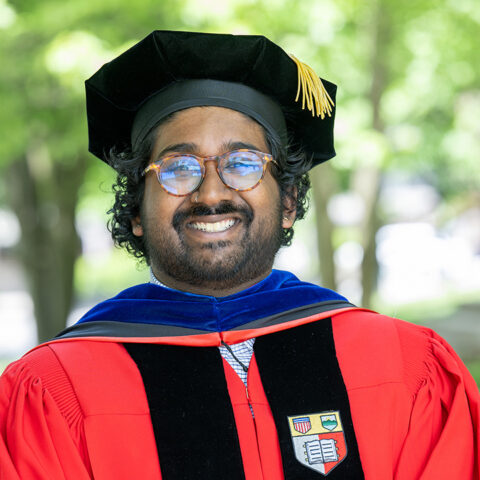Alumni Spotlight: Shyam Raman PhD ’24

Shyam Raman PhD ’24
Degree: Doctorate degree in public policy
Hometown: Valparaiso, Indiana
As an undergraduate student at Indiana University, Shyam Raman quickly learned that he wanted to pursue a career that helped improve the well-being of others. His experience as a research assistant for health economists in IU’s School of Public and Environmental Affairs inspired him to pursue an advanced degree in public policy.
“A lot of my undergrad coursework centered on the social determinants of health: your neighborhood, how close the nearest grocery store is, or the generosity of your state’s safety net programs,” Raman explained. “These are a product of policy decisions and those decisions often systematically disadvantage already marginalized populations in the United States. I chose public policy as my field of study to rigorously investigate the role of policy design on the health and well-being of vulnerable, marginalized populations.”
Today, Raman is a visiting assistant professor of economics at Williams College in Williamstown, Massachusetts, where he teaches about health economics and the politics of social insurance programs. He credits his experience at the Brooks School with providing him a broad education to help address these complex issues.
“The interdisciplinary nature of study was by far my favorite part of being a student at the Brooks School,” he said. “The opportunity to engage with scholars well outside my field of study would have been rare or discouraged elsewhere, but was a key part of my time at Brooks. Having the option to take courses in applied economics, government, and sociology all honed my research and teaching interests in the field of public policy.”
Raman’s dissertation focused on the impact of cannabis laws on prescription drug misuse in the U.S.
“The interdisciplinary nature of study was by far my favorite part of being a student at the Brooks School. The opportunity to engage with scholars well outside my field of study would have been rare or discouraged elsewhere, but was a key part of my time at Brooks.”
“Cannabis laws have been adopted by over half of U.S. states as of July 2024, often with pain as a qualifying condition for cannabis access,” he explained. “My coauthors and I explored the relationship between recreational cannabis law adoption and demand for prescription opioids in the United States. We found that these adult-use cannabis laws were associated with fewer shipments of codeine, a low-potency opioid with a high potential for misuse due.”
Raman concluded that allowing more medical access to cannabis may help to curb prescription drug misuse, and ultimately may serve as a strategy for addressing the opioid epidemic.
Another key to his education at the Brooks School was honing skills in spatial modeling and applied econometrics – skills that are essential to contribute to public policy in today’s society, Raman said.
“In the long-term, I hope to be in a role which allows me to contribute to the dialogue around public policy design and population health,” he said. “The courses, seminars, and mentorship I received from faculty all prepared me for this goal.”
